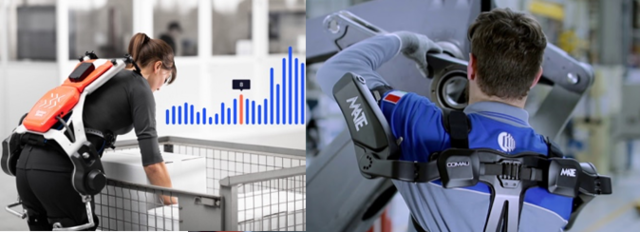
EnableMe50+ - Research Project
How can technologies improve the working ability of older workers and prevent musculoskeletal disorders? These are some of the topics addressed by the FFG-funded research project EnableMe50+ of the IIM, which was recently successfully completed after three years.
Initial situation
The industry is currently facing many challenges, such as an increasing complexity in the work environment, a steadily increasing use of technology in everyday work under the code name "Industry 4.0", a shortening of product life cycles or an increase in the number of variants as well as the associated challenges for manual workplaces. At the same time, the workforce is also undergoing a major transformation. One of the big drivers of change in terms of the workforce is the demographic change. Due to the shift in the median age of working-age people, companies will increasingly have to deal with the special needs and challenges of older employees in the future. At present, this is only practiced consistently in a few companies, and older employees who have built up a valuable wealth of experience for the company over the years are transferred to other jobs or have to leave the company early. The increased demands of older employees in the areas of training and continuing education, technology acceptance, working time requirements, work system design, physical stress and the like are only dealt with superficially. This contributes to an increase in the number of days of incapacity to work by up to five times depending on age, which leads to considerable costs for the Austrian economy and the companies affected.
Research project "EnableMe50+
The three-year FFG-funded project "EnableMe 50+" aims to develop a generic concept for enabling older employees, taking into account the dimensions of technology, organization and people. To this end, the project aimed to develop a structured procedure for identifying age-critical workplaces in companies and adapting them through physical support (e.g. with assistance systems), in order to prevent work-related illnesses. In addition to the IIM as scientific leader, the project also involved the Institute for Labor Research and Labor Policy at the Johannes Kepler University in Linz and the two companies Rosenbauer International AG, and REWE International AG.
Research results
The empirical studies at the companies showed, among other things, that above all physical stresses and illnesses are the main cause of age-specific problem areas in these companies. The exemplary selected solutions from the field of exoskeletons showed a high practical suitability and cause on average a strong relief of physical stress, which is mainly responsible for the development of physical ailments (e.g. reduction of physical stress in activities in logistics by up to 28%). Based on the test results, it can be estimated that the use of a suitable exoskeleton can reduce the ergonomic risk of developing musculoskeletal disorders for over 60% of the workplaces at the industrial partners to ergonomically safe levels. Thus, the key results of EnableMe 50+ consist of the following:
1. methodology for the development of age-appropriate workplaces and work systems based on an age-appropriate ergonomic workplace assessment.
2. solution catalog with concrete methods for supporting older employees in the three dimensions technology - organization - people
3. action framework and procedure model for the identification of a suitable solution for the age-appropriate redesign of work systems as well as for the evaluation of their benefits for employees
4. field testing of the exemplarily selected technology of exoskeletons and development of a procedure for the workplace-specific selection and implementation of these systems.
Based on these partial solutions, we were to create the basis for a targeted and sustainable implementation of measures for age-appropriate workplaces in industry and commerce. Directly after the project, one company partner has already started to introduce exoskeletons for workers in the logistics sector.
